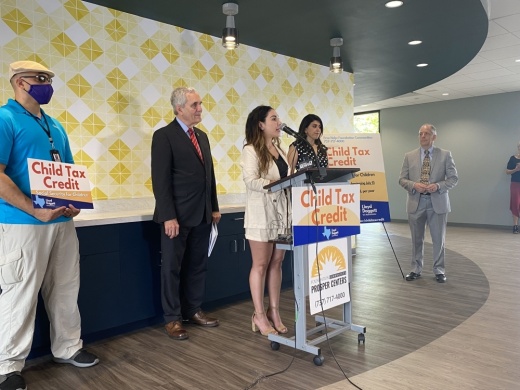Eligible parents with children under 18 are about to have more money in their bank accounts because of a newly expanded Child Tax Credit.
Through the American Rescue Plan, families will receive half of the credit in 2021 through monthly payments from July 15 until December 2021. Payments of $250-$300 per child will be distributed however a stimulus check was received, either via direct deposit or a check will be sent by mail. In 2020, the CTC gave a credit of up to $2,000 per child under 17, according to the Tax Policy Center. Now, families will receive $3,000 per child between 6-17 and $3,600 for children under age six; regarding the advance monthly payments, that is $250 and $300 a month, respectively. Single parents who earn below $75,000, heads of households who earn below $112,000, and married couples who file a joint tax return who earn below $150,000 can receive the full credit, as well as qualified widows and widowers. Homeless parents with children may also receive the money.
There is no limit to the amount of eligible children a family can have to benefit from the CTC, and there is no limit to the amount families who can receive it either, Rep. Doggett said.
Rep. Lloyd Doggett (D-Austin) spoke to the media July 15 alongside Austin City Council Member Vannessa Fuentes and Austin resident Cristina Guajardo at Foundation Communities’ South Prosper Center about how the new CTC will help Austin residents. In a time of great uncertainty and transition, Rep. Doggett said these payments represent hope.
“There was a great deal of discussion about what would have the effect of lifting our poorest families out of poverty and what some of the needs were that families face with rising childcare costs” Rep. Doggett told Community Impact Newspaper.
Foundation Communities provides free services to those in need, from assistance to filing taxes and setting up a bank account to providing affordable housing. Those who still need to file their 2019 and 2020 tax returns to become eligible for the CTC can call 737-717-4000 for assistance in English or Spanish. Those unsure about their eligibility can visit an eligibility assistance tool from the Internal Revenue Service website.
Flyers in English and Spanish will be distributed to immunization sites, concerts held at the Oswaldo A.b. Cantu/Pan American Recreation Center, and at schools with economically disadvantaged children with information regarding how they can get help from Foundation Communities, Rep. Doggett said.
Cristina Guajardo, a single mother of a 3 -year-old child and a May graduate of Texas State University, told her story and her struggles at the press conference. Living with 35 other single moms and their children at the Jeremiah Program, an organization providing services to impoverished families, Guajardo told Community Impact Newspaper that once the news broke about the expanded CTC a few months ago, word spread quickly throughout the building as July 15 neared. Guajardo lost her job, her childcare center within the building, and had to keep up with her schooling and help her son transition to pandemic life, she said.
“One of the phrases that we heard throughout the pandemic was ‘we’re all in this together,’” Guajardo said . “While that did create a sense of unity, it didn’t really apply to everyone because everyone was affected to different degrees. While the world stopped outside, everything inside my apartment kept going fast.”
The new CTC gives her peace of mind because it will help her pay for the increased cost for childcare during a time of intense transition from student to employee and pandemic to a post-pandemic world, Guajardo said. She will use this new free time to search for a job.
“As many parents found out during the pandemic, daycare is essential,” Guajardo said. “It is the bridge that connects us to the outside world.”
Council member Fuentes, who represents Southeast Austin, said the new CTC will pull families and single parents who are struggling out of their difficult situations.
“We are taking the burden off the families in need and giving them a boost to ensure they can put food on the table,” Fuentes said. “Women who have been disproportionately affected by Covid are getting a fair shot to return to the workforce, should they choose to. I realize this is just a drop in the bucket and the reality is that families, especially here in Southeast Austin, need much more consistent funding to break through the economic barriers put before them.”





